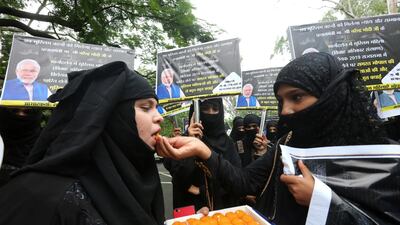India’s parliament on Tuesday passed a bill to criminalise the controversial Islamic practice of talaq, which gives men the right to divorce their wives whenever and as quickly as they wish.
After the bill passed in the Rajya Sabha, parliament’s upper house, Prime Minister Narendra Modi hailed the end of “an archaic and medieval practice.” The abolishment of talaq “corrects a historical wrong done to Muslim women,” he added.
The practice of talaq enables Muslim men to end their marriages by saying the word “talaq” three times. It is part of the body of Muslim personal law practised in India since 1937, which gives Muslims the right to allow their private matters – including marriage, inheritance, and charity – to be governed by rules drawn from Islamic jurisprudence.
The All India Muslim Personal Law Board (AIMPLB), which supervises the application of Muslim Personal Law, has long supported talaq. But other clerics and some Muslim men and women have called the practice regressive and unfair to women, who are often left instantly abandoned by their husbands.
“A man could pronounce talaq, shoot off a letter to us, go to a kazi [Islamic judge], and that will be validated,” said Bader Sayeed, a Chennai-based lawyer and activist for the rights of Muslim women. “The kazi has no actual judicial powers. It’s wrong, what they’re doing. We need a proper judicial divorce.”
In 2016, a woman named Shayara Bano, who had been divorced through talaq by her husband after 15 years, filed a petition in the Supreme Court to outlaw the practice. The next year, after hearing arguments, the court called the practice unconstitutional and pointed out that other Islamic states, such as Saudi Arabia, Afghanistan and Pakistan, had banned it as well.
The court then instructed the government to pass a law to abolish talaq, which Mr Modi’s government has been trying to do ever since.
The first talaq legislation was tabled in December 2017, and was passed by the Lok Sabha, the lower house, where Mr Modi’s Bharatiya Janata Party (BJP) has enjoyed a majority since 2014. But the Rajya Sabha, where the BJP was still in a minority at the time, refused to pass the bill.
An amended version, which clarified the kind of maintenance and allowance that Muslim women and their children were entitled to after a judicial divorce, was passed by the Lok Sabha last December. Then it waited for parliament to reconvene after a long election season.
The BJP still doesn’t have a majority in the Rajya Sabha. But a number of parties that opposed the earlier version of the bill voted in favour of it this year. Others – including five members of the opposition Congress party – abstained from voting altogether. The bill passed with 99 votes in favour and 84 against.
The Congress, which has traditionally courted Muslim organisations such as the AIMPLB, found itself divided over the bill.
The new law promises a prison term of up to three years for any Muslim man who uses talaq to divorce his wife. Congress leaders said on Tuesday that this criminal punishment did not belong in a case that otherwise concerned civil law.
“We had fundamentally supported this bill,” Abhishek Manu Singhvi, a Congress spokesperson, told reporters. If talaq itself no longer exists, he said, “what is the need to criminalise an imaginary thing?”
Raj Babbar, another Congress leader, called the passage of the bill “a historic mistake… A civil law has been changed into a criminal law.”
Asma Zehra, who leads the AIMPLB’s women’s wing, told the IANS news service that most Muslim women opposed the government’s interference in personal law. Last year, she said, AIMPLB collected 50 million signatures – including those of 28.5 million women – protesting the move to end talaq.
Instead, she said, the government “turned a blind eye to the voice of the women and posed itself as messiah of Muslim women.”
The bill will now go to the President Ram Nath Kovind to be cleared – the final step before turning into law. But AIMPLB has already said that it would go to the courts to challenge the three-year prison sentence laid down in the bill.
“What has happened is wrong and it was not needed,” Zafaryab Jilani, an AIMPLB lawyer, said. “We can go for legal action. Once the BJP-led government is gone, parliament can even repeal the law.”

